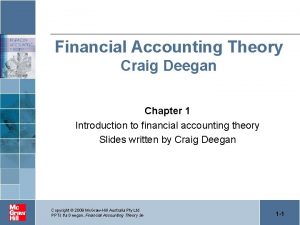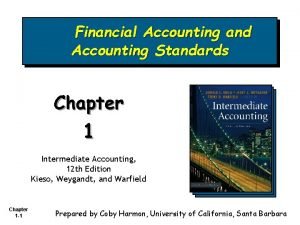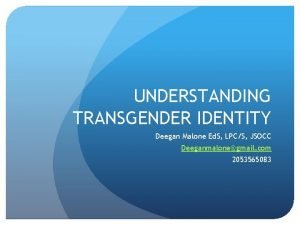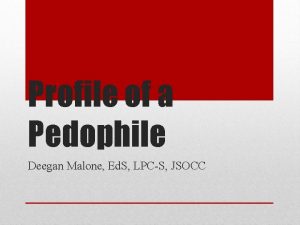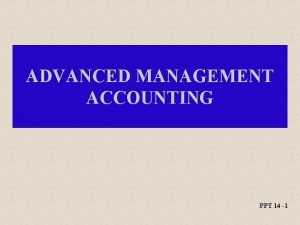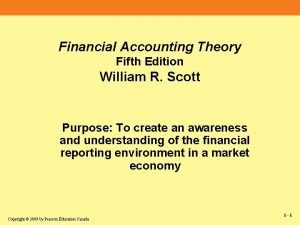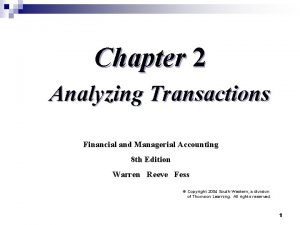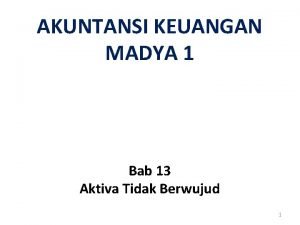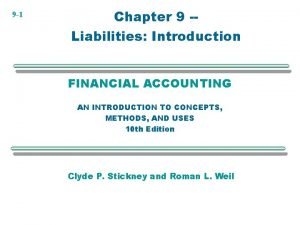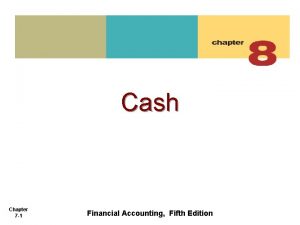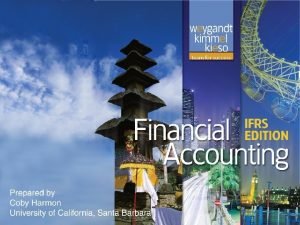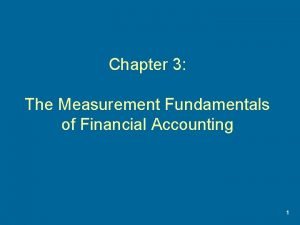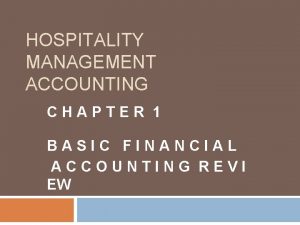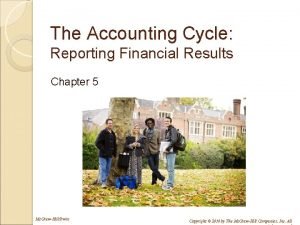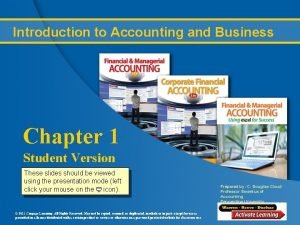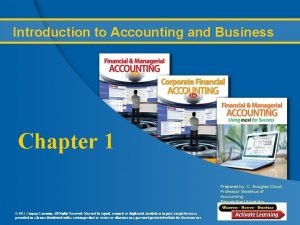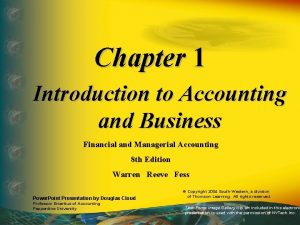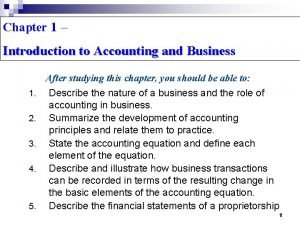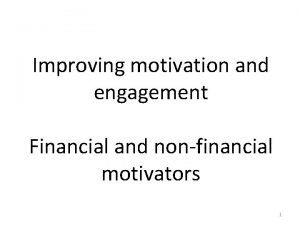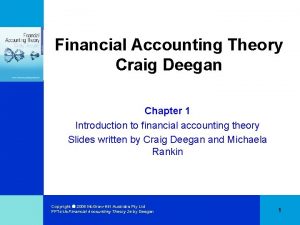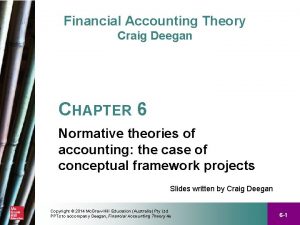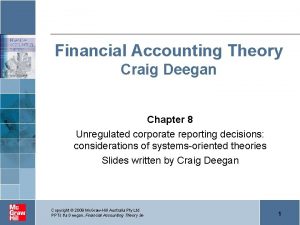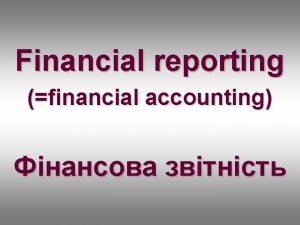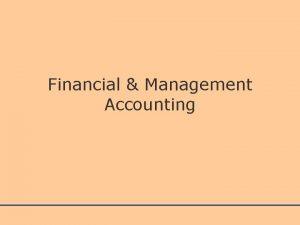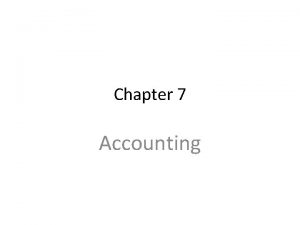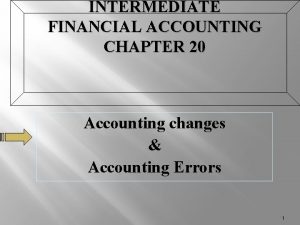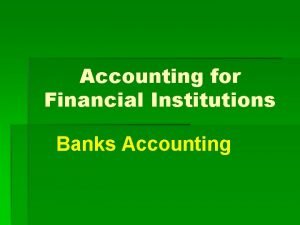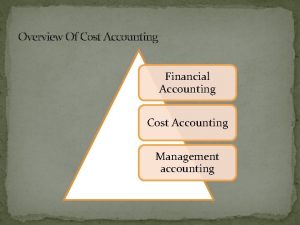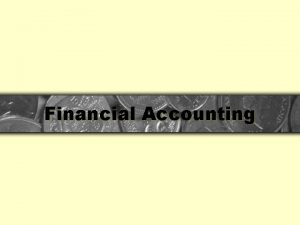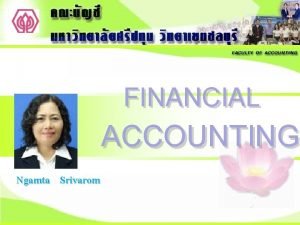Financial Accounting Theory Craig Deegan Chapter 1 Introduction





















- Slides: 21

Financial Accounting Theory Craig Deegan Chapter 1 Introduction to financial accounting theory Slides written by Craig Deegan Copyright 2009 Mc. Graw-Hill Australia Pty Ltd PPTs t/a Deegan, Financial Accounting Theory 3 e 1 -1

Learning objectives • In this chapter you will be provided with evidence that shows that: – there are many theories of financial accounting – knowledge of different accounting theories increases our ability to understand evaluate various alternative financial accounting practices – the different theories of financial accounting are often developed to perform different functions, such as to describe accounting practice or prescribe particular accounting practices Copyright 2009 Mc. Graw-Hill Australia Pty Ltd PPTs t/a Deegan, Financial Accounting Theory 3 e 1 -2

Learning objectives (cont. ) – theories, including theories of accounting, are developed as a result of applying various value judgements and that acceptance of one theory, in preference to others, will in part be tied to one’s own value judgements – we should critically evaluate theories before accepting them – there is good reason for students of accounting to study theories as part of their broader accounting education Copyright 2009 Mc. Graw-Hill Australia Pty Ltd PPTs t/a Deegan, Financial Accounting Theory 3 e 1 -3

What is a theory? • ‘A coherent set of hypothetical, conceptual and pragmatic principles forming the general framework of reference for a field of inquiry’ (Hendriksen 1970, p. 1). • ‘A scheme or system of ideas or statements held as an explanation or account of a group of facts or phenomena’ (The Oxford English Dictionary) A theory could be based on numerous observations (inductive reasoning) or developed on the basis of logic (deductive reasoning) • Could be ‘positive’ or ‘normative’ • Theories can help us make sense of the world in which we live and can provide a structure to understand our (social) experiences Copyright 2009 Mc. Graw-Hill Australia Pty Ltd PPTs t/a Deegan, Financial Accounting Theory 3 e 1 -4

Accounting theories • Accounting is a human activity • It would seem illogical to study financial accounting (for example, the accounting standards) without also studying accounting theory • Theories of accounting consider – people’s behaviour with respect to accounting information – people’s needs for accounting information – why people within organisations elect to supply particular information Copyright 2009 Mc. Graw-Hill Australia Pty Ltd PPTs t/a Deegan, Financial Accounting Theory 3 e 1 -5

Examples of uses of accounting theories • Theories might: – prescribe how assets should be valued – predict why managers will choose particular accounting methods – explain how an individual’s cultural background affects accounting information provided – prescribe what accounting information should be provided to particular classes of stakeholders – predict that the relative power of a stakeholder group will affect the accounting information it receives – explain or predict how accounting disclosures might be used as part of a strategy to legitimise the operations of an organisation Copyright 2009 Mc. Graw-Hill Australia Pty Ltd PPTs t/a Deegan, Financial Accounting Theory 3 e 1 -6

Why study accounting theories? • how elements of accounting should be measured • motivation for individuals to support or lobby regulators for some accounting methods in preference to others • the implications for organisations and their stakeholders if one accounting method is chosen or mandated in preference to others • how and why the capital markets react to particular information • whethere is a ‘true measure’ of income Copyright 2009 Mc. Graw-Hill Australia Pty Ltd PPTs t/a Deegan, Financial Accounting Theory 3 e 1 -7

Overview of theories of accounting • Many theories of financial accounting exist • No universally accepted theory of accounting – different perspectives about the central objective, role and scope of financial accounting • No universally accepted perspective about the role of accounting theory – different researchers have different perspectives of the role of accounting theory (for example, to explain and predict practice versus prescribing particular practice) – a researcher’s own values will influence which theory he or she elects to embrace Copyright 2009 Mc. Graw-Hill Australia Pty Ltd PPTs t/a Deegan, Financial Accounting Theory 3 e 1 -8

Early development of accounting theory • Relied upon the process of induction – development of ideas or theories through observation • 3 conditions (Chalmers 1982): -large number of observations. -observations repeated under wide variety of conditions. -no accepted observation should conflict with the derived universal law. • 1920 s to 1960 s theories developed from observing what accountants did in practice Copyright 2009 Mc. Graw-Hill Australia Pty Ltd PPTs t/a Deegan, Financial Accounting Theory 3 e 1 -9

• After observing what accountant did in practice were codified in form of conventions of accounting. Notable theoriests at that time are: Paton(1922), Paton and Littleton(1927), Hatfiled(1927), Canning (1930). Copyright 2009 Mc. Graw-Hill Australia Pty Ltd PPTs t/a Deegan, Financial Accounting Theory 3 e 1 -10

• Prudent concept, monetary unit measurement were observed and then generalized as accounting principles at that time. • But after 1960 research based on inductive approach was subject to many criticism like: what is not or what should not be these issues were not addresses. Copyright 2009 Mc. Graw-Hill Australia Pty Ltd PPTs t/a Deegan, Financial Accounting Theory 3 e 1 -11

Example of inductive approach to theory development • Grady (1965) undertook research commissioned by the American Institute of Certified Public Accountants (AICPA). Later AICPA went for prescriptive studies for measurement systems be changed from historical cost to a system based on current values. History shows that regulatory bodies rarely accepted prescriptions for significant change to accounting practices. • Formed the basis of APB Statement No. 4 ‘Basic Concepts and Accounting Principles Underlying the Financial Statements of Business Enterprises’ – reflected generally accepted accounting principles at the Copyright time 2009 Mc. Graw-Hill Australia Pty Ltd 1 -12 PPTs t/a Deegan, Financial Accounting Theory 3 e

Theory development— 1960 s and 1970 s • Known as the ‘normative period’ of accounting research • Sought to prescribe particular accounting practices – known as normative theories (normative theories provide prescription) • Not driven by existing practices, and hence not typically inductive in nature (that is, not based on observation) • Rather, were deductive in nature and, based on logical argument, sought to develop new methods of accounting • Theories critical of historical cost accounting • Sought to provide improved approaches to asset valuation in a time of widespread inflation Copyright 2009 Mc. Graw-Hill Australia Pty Ltd PPTs t/a Deegan, Financial Accounting Theory 3 e 1 -13

Example of prescriptive theory • 1961 and 1962 studies by Moonitz, and Sprouse and Moonitz commissioned by the Accounting Research Division of the AICPA • Authors proposed that accounting measurement systems be changed from historical cost to a system based on current values • Such research should not be evaluated by reviewing current practice (indeed, there is a general rule that prescriptions about what should be should not be evaluated by reviewing observations of what is) • Not supported by AICPA as too radically different from current practice Copyright 2009 Mc. Graw-Hill Australia Pty Ltd PPTs t/a Deegan, Financial Accounting Theory 3 e 1 -14

Normative theories • Based on what the researcher believes should occur in particular circumstances – not based on observation • Example of normative theory – Continuously Contemporary Accounting (Co. A) by Raymond Chambers – Conceptual Framework of Accounting – Social and environmental reporting • Should not be evaluated on whether they reflect actual accounting practice Copyright 2009 Mc. Graw-Hill Australia Pty Ltd PPTs t/a Deegan, Financial Accounting Theory 3 e 1 -15

Classifications of normative theories • True income theories – make assumptions about the role of accounting then seek to provide a single ‘best measure’ of profits • Decision usefulness theories – ascribe a particular type of information for particular classes of users on the basis of assumed decisionmaking needs Copyright 2009 Mc. Graw-Hill Australia Pty Ltd PPTs t/a Deegan, Financial Accounting Theory 3 e 1 -16

Decision usefulness theories • Decision-makers emphasis – undertaking research that seeks to ask decision makers what information they want – knowledge then used to make prescriptions about what information should be supplied • Decision-models emphasis – develops models based on the researchers’ perceptions about what is necessary for efficient decision making Copyright 2009 Mc. Graw-Hill Australia Pty Ltd PPTs t/a Deegan, Financial Accounting Theory 3 e 1 -17

Theory development—mid to late 1970 s • Research aimed at explaining and predicting accounting practice rather than prescribing particular practices • Known as positive theories • Contrast with normative theories Copyright 2009 Mc. Graw-Hill Australia Pty Ltd PPTs t/a Deegan, Financial Accounting Theory 3 e 1 -18

Positive theories • Seek to predict and explain particular phenomena • Begins with assumption(s), and through logical deduction enables prediction(s) to be made • If predictions are sufficiently accurate when tested against observations of reality, they are regarded as having provided explanation of why things are as they are Copyright 2009 Mc. Graw-Hill Australia Pty Ltd PPTs t/a Deegan, Financial Accounting Theory 3 e 1 -19

Positive theories (cont. ) • Positive Accounting Theory – developed by Watts and Zimmerman – is a specific example of a positive theory of accounting – seeks to predict and explain why accountants elect to adopt particular accounting methods in preference to others – based on ‘rational economic person’ assumption § individuals motivated by self-interest tied to wealth maximisation § challenges the view that accountants will be ‘objective’ Copyright 2009 Mc. Graw-Hill Australia Pty Ltd PPTs t/a Deegan, Financial Accounting Theory 3 e 1 -20

Criticism of normative theories—an example • Normative theories have been criticised for lack of empirical observation – they are based on personal opinion about what should happen – positive theorists argue that they would prefer to provide information about expected implications of actions and let others decide themselves what they should do – positive theorists also make value judgements Copyright 2009 Mc. Graw-Hill Australia Pty Ltd PPTs t/a Deegan, Financial Accounting Theory 3 e 1 -21
 Normative theory
Normative theory Financial accounting and accounting standards chapter 1
Financial accounting and accounting standards chapter 1 Deegan malone
Deegan malone Deegan malone
Deegan malone Responsibility accounting ppt
Responsibility accounting ppt Financial accounting theory scott
Financial accounting theory scott Chapter 2 solutions managerial accounting
Chapter 2 solutions managerial accounting Financial accounting chapter 13
Financial accounting chapter 13 Financial accounting chapter 6
Financial accounting chapter 6 Financial accounting chapter 9
Financial accounting chapter 9 Financial accounting chapter 7
Financial accounting chapter 7 Financial accounting ifrs 4th edition chapter 12
Financial accounting ifrs 4th edition chapter 12 Financial accounting chapter 3
Financial accounting chapter 3 Accounting chapter 2
Accounting chapter 2 Financial accounting chapter 1
Financial accounting chapter 1 Financial accounting chapter 5
Financial accounting chapter 5 Chapter 1 introduction to accounting and business
Chapter 1 introduction to accounting and business Chapter 1 introduction to accounting and business
Chapter 1 introduction to accounting and business Introduction to accounting and business chapter 1
Introduction to accounting and business chapter 1 Accounting in business chapter 1
Accounting in business chapter 1 Comprises 70% of business entities in the united states
Comprises 70% of business entities in the united states Financial methods of motivation
Financial methods of motivation
